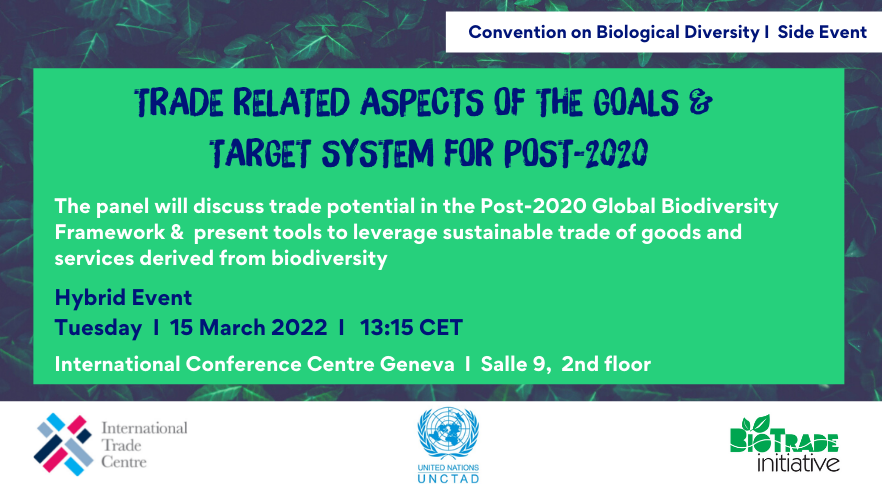On 15 March 2022, the United Nations Conference on Trade and Development (UNCTAD) and the International Trade Centre (ITC) hosted the hybrid side event “Trade Related Aspects of the Goals and Target System for Post 2020” during the Convention on Biological Diversity (CBD) – Geneva meetings.
Biodiversity loss is advancing at an alarming rate, putting our entire world in danger. Currently a new post-2020 global biodiversity framework (GBF) is being negotiated under the CBD which aims for a transformational change to safeguard biological diversity. It is also crucial that the framework addresses the underlying drivers of biodiversity loss which includes trade. Trade is an indispensable part of sustainable development and shifting to sustainable trade can contribute to achieving biodiversity objectives. Thus, the current negotiations of the framework needs to consider both challenges and opportunities that trade brings.
The session gathered experts to discuss the potential of trade for the post-2020 global biodiversity framework, including the role of voluntary sustainability standards (VSS) for biodiversity conservation and sustainable trade of biodiversity-based goods and services.
Participants experts:
Mr. Andreas Obrecht, Biodiversity Consultant – Presentation of key results of the two workshops on Trade and biodiversity for the post-2020 global biodiversity framework held on 2021
Ms. Ana Patricia Batalhone, Project Officer, International Trade Center (ITC) – Presentation of ITC and UNCTAD’s BioTrade self-assessment tool
Ms. Preshanthie Naicker, Department of Forestry, Fisheries, and the Environment, South Africa – Reflection on trade and the post-2020 global biodiversity framework from a CBD party perspective .
Ms. Lorena Jaramillo, Economic Affairs Officer, UNCTAD – Presentation of UNCTAD’s Trade and Biodiversity Stats database
Mr. Julian Benda, Trade consultant – Demonstration of UNCTAD’s Trade and Biodiversity Stats database
Key messages from the panel:
- There are different tools available to assess and support decision-making that favours more biodiversity-oriented trade policies at the governmental and corporate level.
- Tools such as the BioTrade Self-Assessment Tool, voluntary sustainability standards specific to biodiversity and data on trade flows of biodiversity-based goods can contribute to the post-2020 GBF as well as to the progress towards biodiversity-friendly trade.
- Engagement of key stakeholders – including private, civil society, and governments – to support and implement initiates and tools supportive to sustainable trade is crucial.
Learn more about ITC GreenToCompete’s work on biodiversity: www.greentocompete.org/biodiversity

